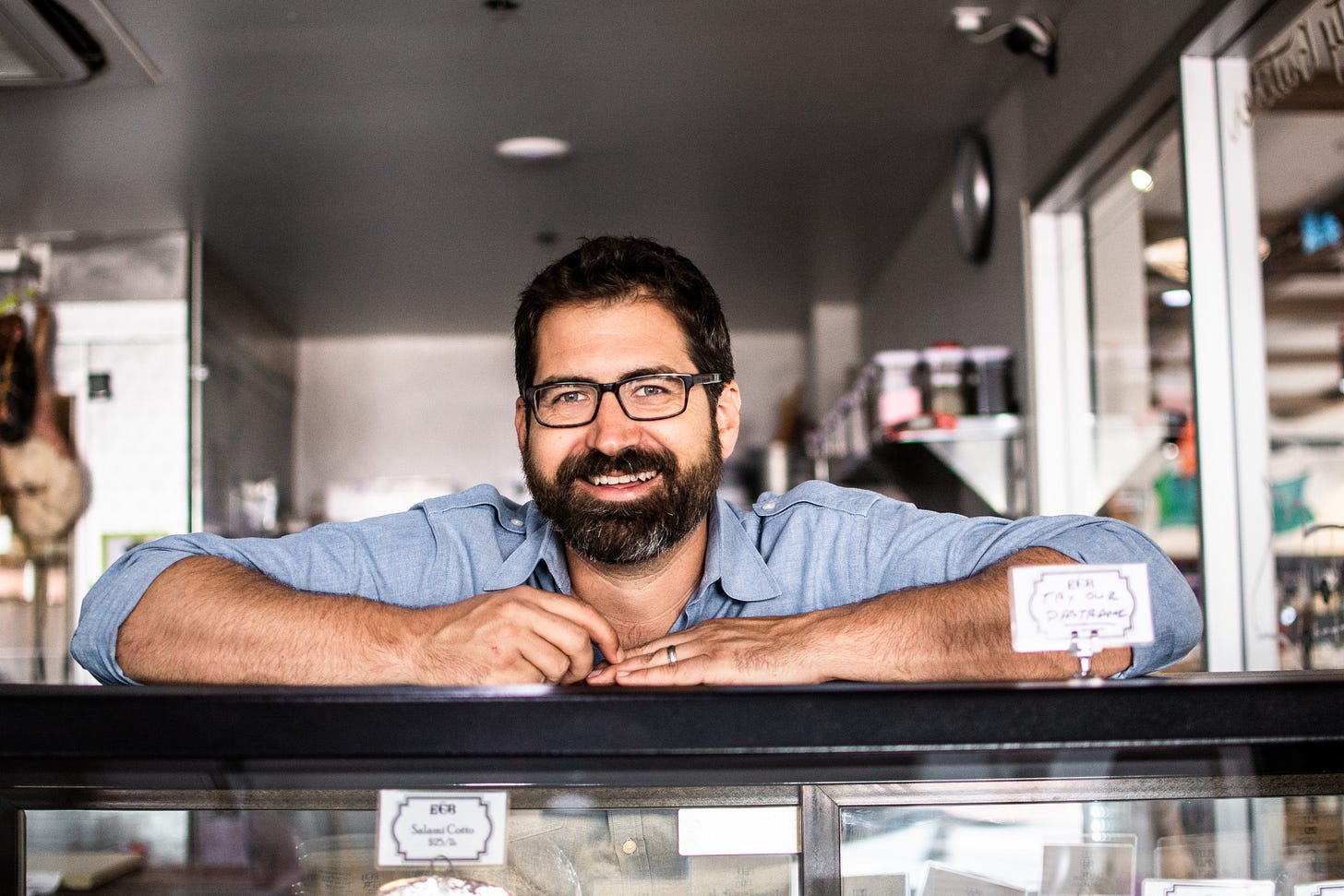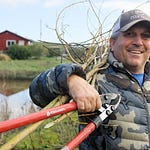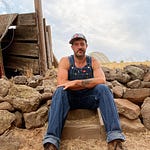This month's episode of The Enlightened Omnivore Podcast puts me in an unfamiliar position - the guest chair. My friend and previous guest, chicken guru Tyler Dawley of Big Bluff Ranch, takes over hosting duties, turning the microphone around on me to explore my own journey with food, farming, and family. It felt a little vulnerable sharing my story, but once I got the hang of it, Tyler couldn’t shut me up.
Although I still consider myself on the path to enlightenment, it hasn't been exactly straightforward. I started as a "big-boned kid" who struggled with weight through childhood, disinterested in where my food came from, I only cared about the quantity. And when I found myself faced with unlimited dining hall options in college, let’s just say I overindulged.
But a couple of college summers working in the fields of a communist kibbutz in Isreal—of all places—really began to shape my understanding of food and farming. In dairy barns, chicken hatcheries and cotton fields, I discovered a connection to agriculture I didn’t realize I had. With dirt under my nails, I realized that growing food was more than a way to make some extra bucks in the summer. It was a newfound spiritual connection to creation, something that would forever affect my appreciation of food and the communities around the world who produced it.
Earlier in the week, Tyler asked me to prepare a food philosophy. I don’t know if I have ever really put much thought in such a thing. For months, I’ve had on my to do list to define what I even think an Enlightened Omnivore really is! But when I sat down this week to think about it, things came pretty quickly:
Regenerative: Food that rebuilds our capacity to make more food is the most intuitive and sustainable model we can embrace.
Resilient: Just like nature's most successful species, our superpower as omnivores lies in maintaining a diverse diet that doesn't over-rely on any single calorie source.
Restorative: The most important ingredient in any meal is love - food must nourish not just our bodies, but our minds, spirits, and connections with each other.
I go into more depth about what each of these principles mean to me, but I take them seriously, and I realize that they aren’t just what I write about on Enlightened Omnivore, they are also how I put food on my family's dinner table. And as a father of three teenagers, I'm constantly balancing the practical realities of feeding hungry kids with my commitment to quality and responsible sourcing. It’s hard to keep to principles when you have hangry adolescents barking at you.
I’ll admit, I go a little off road with our conversation. Somehow the topic of food waste came up–which does deeply trouble me. To clarify what I said, although it’s not a 1-to-1 ratio of food waste, the USDA estimates 30-40 percent of calories raised in America are thrown away. When you consider all the time and energy spent in raising crops and animals, it seems criminal that a third ends up in a landfill.
I step higher up on my soap box to talk about alternative approaches to agriculture, and I even challenge the US system to be more like—gasp—France! Where quality is prioritized over quantity. Technically, the French actually spend more per acre in agricultural subsidies than we do in the states. But I would take the results of their policies—the village markets of Provence or the world renown quality of French produce—rather than cheap vegetable oil and prime marbled beef raised in the sterile and polluted soils of Kansas and Iowa. Just ask my friend Austin Frerick how subsidies are serving his community. I can dream that California may one day experiment with agriculture in the same way it has encouraged sustainable energy.
But perhaps what I'm most proud of that came out of today’s conversation is the power of sharing meals. In our increasingly digital world, the dinner table remains one of the last places for genuine human connection. It's the only time I see my kids most days, where we share not just food but also our hearts. Most nights we go around the table and ask, “one good, one bad,” offering each other a summarized snapshot of our individual days that often stimulates minutes of conversation. Words I savor more than any bite of food. And it’s no surprise that Harvard University research backs up my assertion - having regular family dinners is one of the best things we can do for our children’s wellbeing. I think of it as medicine for the soul. Please titrate my dose!
Tyler was urging me to make this a practical podcast encouraging me to offer suggestions to those intent on making changes in their own lives. I was a bit skeptical that anyone would listen, but I did share a bit of what I do. Asking grocery store clerks where my food comes from. Cooking at least one meal a week with my family. Making the dinner table a phone-free zone. These simple steps can have a profound effect on how we connect with our food and with family.
Also for folks who want to get involved in the fathomless depths of agricultural policy, you might consider organizations like MALT or read anything from the fantastic publication, Civil Eats before you get started. Or simply reach out to me with specific policy thoughts. I’ve got plenty of opinions to share.
The truth is, striving to be a more enlightened omnivore isn't about perfection - it's about mindfulness and connection. Whether I'm making my twice-monthly batch of spaghetti sauce, or teaching my kids how to cook, I'm constantly reminded that our relationship with food goes far beyond nutrition. It's about how we sustain ourselves, our families, and our communities.
I'm grateful to Tyler for this opportunity to share my story. For me, this whole journey has been about better defining what mindful eating really means.
And perhaps that's the real enlightenment - recognizing that every meal is an opportunity to nourish not just our bodies, but our relationships, our communities, and our planet. Whether it's a carefully sourced farm-to-table dinner or a hurried weeknight meal with my teenagers, each bite connects us to something larger than ourselves. As I continue this journey, I'm learning that being an enlightened omnivore isn't about reaching some distant destination - it's about staying present for each step along the way.











